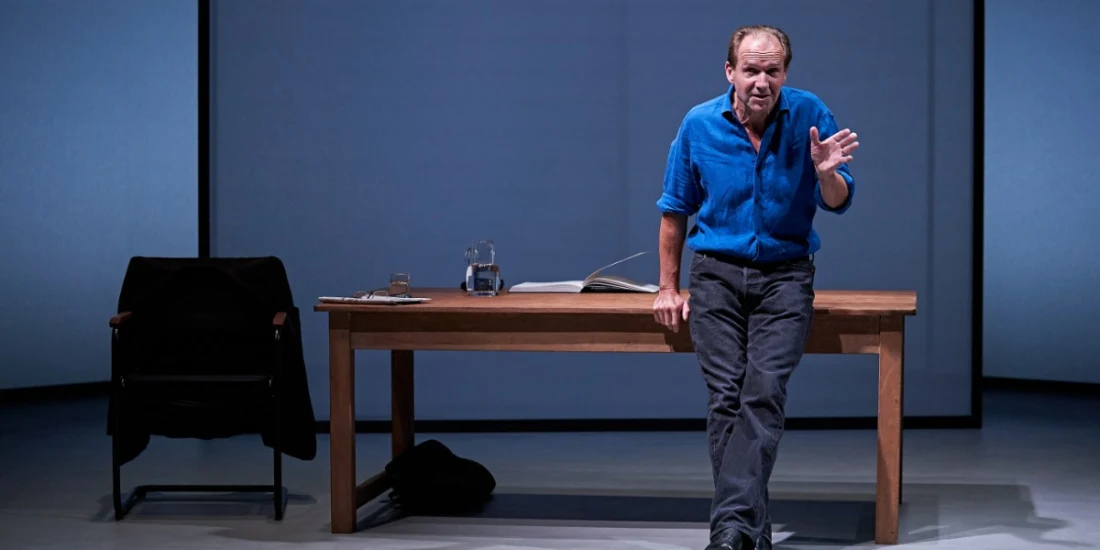Review - Beat the Devil at the Bridge Theatre
"Dream and reality become indistinguishable." This, David Hare's engrossing new monologue informs us, was part of the bludgeoning battery of effects wrought on his body and mind, as both the playwright and a locked-down Britain battled Covid-19. It's a symptom even those of us spared direct experience of the virus will recognise: 2020 has been a surreal nightmare of terrifying invisible threat, corrupt, incompetent government, isolation, confusion, and racist violence - all of which have brutally exposed the fissures that divide society.
Hare's 50-minute piece opens a socially distanced season of solo dramas at the Bridge, comprising eight of Alan Bennett's Talking Heads alongside new works by Inua Ellams, Yolanda Mercy and Zodwa Nyoni. Characteristically, the author takes the temperature of the nation by yoking the personal and the political. Britain is sick, and not just from the coronavirus; we're ruled by a feckless cabal of liars who despise the rest of us. Hare's writing vibrates with rage. It's also grippingly vivid, crackling with gallows humour, and illuminated by tenderness. Nicholas Hytner's production is cleanly calibrated for maximum clarity and impact. And Ralph Fiennes's performance is masterly.
Fiennes addresses us from a writing desk, his jacket hung over the chair, a jug of water to hand. With the theatre's seating drastically reduced, resulting in an auditorium filled with unnatural gaps, a sense of dislocation could easily have crept in, yet the staging is extraordinarily intimate. Fiennes's delivery has an immediacy that reaches out to each separated seat. Far from declamatory, it feels conversational.
So there's a real, mounting dread as he leads us on the journey from diagnosis via Zoom to the ghastly suffering that swiftly ensues. The virus is a treacherous shapeshifter, inflicting a range of symptoms he describes as "medieval" in their ferocity and grimness: he feels "air-hungry," with a "furriness around the lungs"; he's pole-axed by exhaustion; he vomits constantly; he's chilled to the bone, plagued by conjunctivitis and herpes. Everything he eats or drinks tastes and smells of sewage. It's as if a dirty bomb has exploded inside him - or he's been possessed by the devil.
Hare's wife, Nicole (Farhi, the fashion designer), tries to nurse him, even warming his shivering limbs by laying her own naked body on top of his. As he descends into the delirious "mad phase" of the illness, the outside world trickles in from television and the media, insanity piling upon insanity. He rails and despairs at governmental bungling and double-talk: the folly of "herd immunity," the ludicrous machismo of Trump, who thinks sickness only happens to "losers," and Boris Johnson, who, Hare maintains, only concedes that Covid is a "disease for men" after he catches it, and imagines he overcame it through valiant strength of character. The mendacity and callous disregard for human life bring Hare, and us, to incandescent fury. Already choking on his own bile thanks to the virus, he jokes bitterly, "If I wasn't gagging, I'd be gagging."
There's a glow of hope and renewal in the final moments, as the now-recovered Hare celebrates a joyous gratitude for his life. But there's no complacency about the long road to be travelled, or the demons still to be exorcised. This is focused, furious theatre; it leaves you deeply angry, but energised.
Beat the Devil is at the Bridge Theatre until 31 October.
Originally published on
